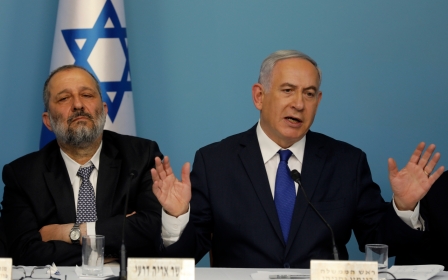Israelis resume corruption protests against Netanyahu amid third Covid-19 lockdown
Thousands of Israelis have restarted protests against Prime Minister Benjamin Netanyahu, calling on the long-serving leader to resign over corruption charges against him and his mishandling of the coronavirus pandemic.
Demonstrators were pictured in Jerusalem on Saturday night holding placards calling on Netanyahu to "go" and "let my people go".
The protests took place near the prime minister's residence as the country continues to vaccinate its population in the middle of its third national pandemic lockdown.
Netanyahu has faced weekly protests calling on him to resign over bribery allegations, fraud, and breach of trust connected to three long-running investigations.
His trial on the three cases was set to resume this week but was postponed due to tightened restrictions because of the Covid-19 pandemic. Court proceedings are now due to resume next month.
Stay informed with MEE's newsletters
Sign up to get the latest alerts, insights and analysis, starting with Turkey Unpacked
The 71-year-old leader denies the corruption charges and has described the campaign against him as a "witch-hunt".
On Saturday, Israel recorded four new cases of the Covid-19 variant first detected in South Africa, from travellers from the African country.

The South African variant, like the British variant, is reported to be more infectious than previous variants of the virus.
In the past few weeks, Netanyahu has fronted a vaccination drive that has given the first of two vaccine doses to nearly 20 per cent of the population.
He has put the vaccination drive at the forefront of his re-election campaign building towards voting that is due on March 23. It will be Israel's fourth general election in two years, and Netanyahu struggled to put together a stable coalition after elections in April and September last year.
On Thursday, Netanyahu said he had secured enough vaccines to vaccinate the whole adult population by the end of March.
Middle East Eye delivers independent and unrivalled coverage and analysis of the Middle East, North Africa and beyond. To learn more about republishing this content and the associated fees, please fill out this form. More about MEE can be found here.




